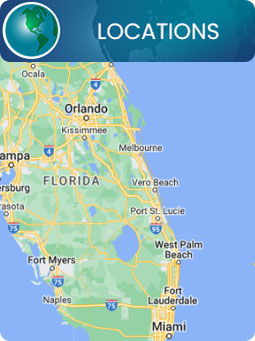Degenerative Disc Disease Treatment Specialist Q&A
Degenerative disc disease happens when the discs in your spine tear out. Neck and back discomfort are the most prevalent symptoms of degenerative disc disease. Our physicians at Global Neuro & Spine Institute provide advanced treatment for degenerative disc disease. Contact us today to learn more or schedule an appointment online. We have convenient locations to serve you in Orlando FL, Jensen Beach FL, Malabar Palm Bay FL, Atlantis FL, Fort Pierce FL, Winter Park FL and Plantation, FL.


Table of Contents:
What are the stages of degenerative disc disease?
What is the best treatment for degenerative disc disease?
Does a degenerative disc ever heal?
How can I prevent degenerative disc disease from getting worse?
It is very normal to experience vertebral disc degeneration as we age and it is often just considered to be part of the aging process for our bodies, but if left untreated, degenerative disc disease can lead to severe pain that is much harder to treat or manage.
The four stages of degenerative disc disease are as follows:
– The dysfunction stage
In this initial stage of degenerative disc disease, the spine starts to lose protection as the discs that would normally absorb shock with forceful movements lose proper functioning. It is common for patients to note mild pain in the back and neck, or just general discomfort.
– The dehydration stage
The discs continue to degrade, becoming thinner as they become dehydrated, leading to bone spurs, visible spinal deformities, and increased levels of pain that are experienced more frequently.
– The stabilization stage
As a response to the degrading discs, the spine attempts to “stabilize” itself, leading to increased levels of pain, muscle aching, and limited mobility. Throughout all of the first three stages, the condition is classified as moderate degenerative disc disease and can still be fairly easily treated if treatment has commenced by this point and the condition does not continue to worsen.
– The collapsing stage
At this point, the discs have completely degraded and herniated, leading to severe pain as the bones no longer have the discs to prevent them from rubbing against one another and the herniated discs push into the surrounding nerves. This is when the disease becomes severe and increasingly challenging to treat.
If not too far advanced, the most effective treatment for the degenerative disc is through physical therapy and pain medication to achieve both immediate and long-term pain relief and limit the loss of mobility as much as possible. Other non-surgical options that are first explored for the treatment of degenerative disc disease include steroid injections into the affected areas to reduce pain levels and inflammation, or radiofrequency neurotomy, which uses currents of electricity to prevent the signals indicating pain from reaching the brain, resulting in long-term pain relief. If none of these less invasive treatment options prove to be effective, there are several spinal decompression surgeries that can be performed, including a diskectomy, foraminotomy, laminectomy, spinal fusion, and osteophyte removal.
A damaged spinal disc is not able to heal, so treatments for degenerative disc disease will focus on managing the associated symptoms, specifically pain. Many patients with degenerative disc disease can live the rest of their lives pain-free and experience almost no symptoms, but the trick is that the progression of the condition must be properly controlled. If the cause of the degeneration is a misalignment in the spine (scoliosis), and the condition is caught early enough before it has progressed much, the discs can technically regenerate. However, this regeneration takes quite a bit of time and therapies to essentially reverse the spinal curve in order to allow for the spinal discs to return to their original position. There is no real quick fix that will just heal the discs that have started to degenerate, but there are many treatment options that will provide symptom and pain relief, and allow patients to live comfortably for years to come.
One of the most effective ways to prevent your degenerative disc disease from progressing is by maintaining a healthy lifestyle. Staying active to keep off excess weight as well as staying flexible will ensure that your spinal discs stay strong and mobile, preventing further degradation from occurring. It is also highly recommended that patients suffering from degenerative disc disease avoid or quit smoking as that will prove to help slow down the progression of the condition as well. Most physicians will tell their patients to prioritize stretching in their day-to-day lives and to pay attention to their posture, often recommending different types of activities or exercises that will ensure that the joints are properly stretched and strengthened without being overworked or potentially leading to further damage.
For more information, contact us or book an appointment online. We serve patients from all across the Sunshine State, in Orlando FL, Conway FL, Edgewood FL, Jensen Beach FL, Ocean Breeze FL, Rio FL, Malabar Palm Bay FL, Melbourne FL, Atlantis FL, Palm Springs FL, Boynton Beach FL, Fort Pierce FL, White City FL, St Lucie FL, Plantation FL, Pine Island Ridge FL, Lauderhill FL, Winter Park FL, Bertha FL, Alafaya FL and surrounding areas.

CONDITIONS WE TREATED:
- Facet Joint Disorders
- Back Surgery Complications
- Migraines
- Herniated Discs
- Back Pain
- Lower Back Pain
- Neck Pain
- Sciatica Pain
- Abdominal Pain
- Compression Fractures
- Joint Pain Treatments
- Shoulder Pain Treatments
- Elbow Pain Treatments
- Hip Pain Treatments
- Knee Pain Treatments
- Diabetic Peripheral Neuropathy
- Complex Regional Pain Syndrome
- Pelvic Pain
- Occipital Neuralgia
- Chest Wall Pain
- Chronic Facial Pain
- Phantom Limb Pain
- Interstitial Cystitis – Pelvic Pain
- Herpetic Neuralgia
- Cervical Radiculopathy
- Degenerative Disc Disease
ADDITIONAL SERVICES
- Kyphoplasty
- Epidural Steroid Injection
- Posterior Facet Blocks – Rhizotomy
- Sacroiliac Joint Injection
- Percutaneous Discectomy
- Stellate Ganglion Blocks
- Intercostal Nerve Blocks
- Intra-Articular Peripheral Joint Injection
- Lumbar Epidural Steroid Injections
- Coccygeal Nerve Block
- Occipital Nerve Blocks / Rhizotomy
- Selective Nerve Root Blocks
- Discography
- Hardware Blocks
- Cluneal Nerve Block
- Spinal Cord Stimulators
- Sympathetic Nerve Blocks
- Headaches Treatments

CONDITIONS WE TREATED:
- Facet Joint Disorders
- Back Surgery Complications
- Migraines
- Herniated Discs
- Back Pain
- Lower Back Pain
- Neck Pain
- Sciatica Pain
- Abdominal Pain
- Compression Fractures
- Joint Pain Treatments
- Shoulder Pain Treatments
- Elbow Pain Treatments
- Hip Pain Treatments
- Knee Pain Treatments
- Diabetic Peripheral Neuropathy
- Complex Regional Pain Syndrome
- Pelvic Pain
- Occipital Neuralgia
- Chest Wall Pain
- Chronic Facial Pain
- Phantom Limb Pain
- Interstitial Cystitis – Pelvic Pain
- Herpetic Neuralgia
- Cervical Radiculopathy
- Degenerative Disc Disease
ADDITIONAL SERVICES
- Kyphoplasty
- Epidural Steroid Injection
- Posterior Facet Blocks – Rhizotomy
- Sacroiliac Joint Injection
- Percutaneous Discectomy
- Stellate Ganglion Blocks
- Intercostal Nerve Blocks
- Intra-Articular Peripheral Joint Injection
- Lumbar Epidural Steroid Injections
- Coccygeal Nerve Block
- Occipital Nerve Blocks / Rhizotomy
- Selective Nerve Root Blocks
- Discography
- Hardware Blocks
- Cluneal Nerve Block
- Spinal Cord Stimulators
- Sympathetic Nerve Blocks
- Headaches Treatments






